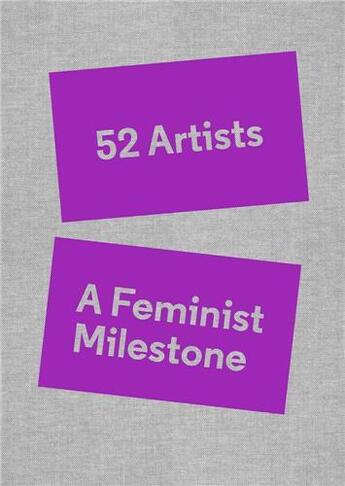Résumé:
The definitive account of Lucy Lippard's pioneering 1971 feminist art exhibition, with work from a new generation of artists alongside the original participants.
This volume celebrates the 51st anniversary of the historic 1971 exhibition Twenty Six Contemporary Women Artists, curated by Lucy... Voir plus
The definitive account of Lucy Lippard's pioneering 1971 feminist art exhibition, with work from a new generation of artists alongside the original participants.
This volume celebrates the 51st anniversary of the historic 1971 exhibition Twenty Six Contemporary Women Artists, curated by Lucy R. Lippard and presented at the Aldrich Contemporary Art Museum. It showcases work by the artists included in the original 1971 exhibition, alongside a new roster of 26 female-identifying or nonbinary emerging artists, tracking the evolution of feminist art practices over the past five decades.
This significant volume includes new essays by Lippard, Amy Smith-Stewart and Alexandra Schwartz, as well as rare historical documentation of the original exhibition, images, installation views and checklists from both the 1971 and 2022 shows.
Among the artists whose work was presented in the original 1971 exhibition are Cecile Abish, Alice Aycock, Cynthia Carlson, Susan Hall, Mary Heilmann, Audrey Hemenway, Laurace James, Mablen Jones, Carol Kinne, Christine Kozlov, Brenda Miller, Mary Miss, Dona Nelson, Shirley Pettibone, Howardena Pindell, Adrian Piper, Sylvia Plimack Mangold, Reeva Potoff, Paula Tavins, Merrill Wagner, Grace Bakst Wapner, Jackie Winsor and Barbara Zucker. (All but three of the original 26 artists are included in 52 Artists.) The new generation of artists included are Leilah Babirye, Phoebe Berglund, LaKela Brown, Lea Cetera, Susan Chen, Pamela Council, Lizania Cruz, Amaryllis DeJesus Moleski, Florencia Escudero, Alanna Fields, Emilie L. Gossiaux, Ilana Harris-Babou, Loie Hollowell, Maryam Hoseini, Hannah Levy, Catalina Ouyang, Anna Park, Erin M. Riley, LJ Roberts, Aya Rodriguez-Izumi, Aliza Shvarts, Astrid Terrazas, Tourmaline, Rachel Eulena Williams, Kiyan Williams and Stella Zhong.














